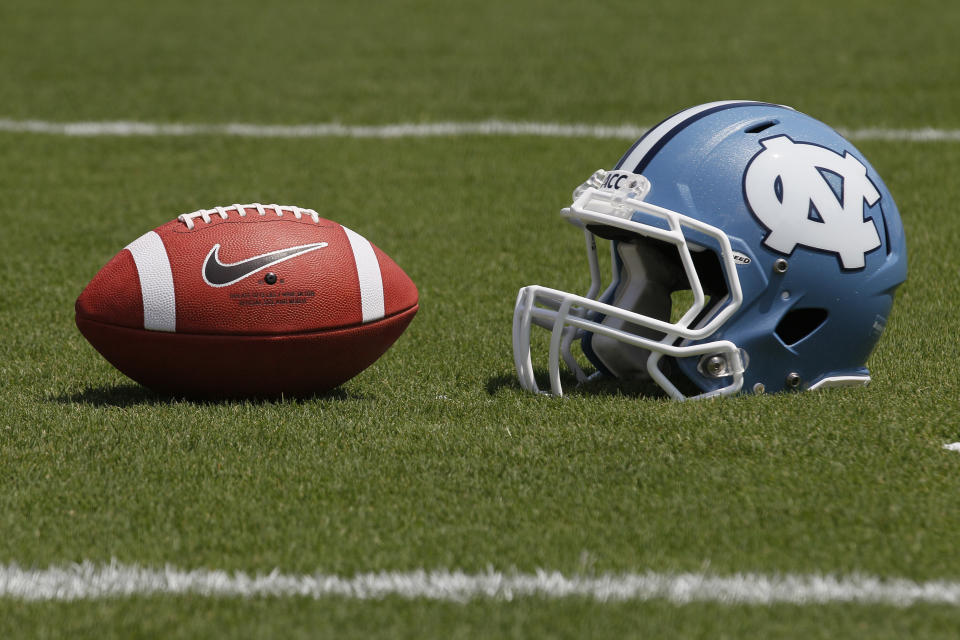UNC's 'cluster' highlights glaring issue as students return, leave campus – 'Amateurism truly is a myth'
Jay Smith is a history professor at the University of North Carolina. And among his spring course offerings is a class with a syllabus that’s playing out in real time. Smith teaches “Big-Time College Sports and the Rights of Athletes, 1956 – present.”
At UNC this fall, the present part of that course has rarely been so compelling. UNC students recently returned to campus without the school requiring them to be tested for COVID-19. On Monday, the school announced in the wake of at least four clusters of positive tests that it was ending on-campus instruction for the semester.
But the school didn’t hesitate to announce soon after that athletics were powering on, which meant football plans to march ahead with its ACC schedule. The school did announce Wednesday afternoon that there’d be a pause in athletics until at least Thursday at 5 p.m.
UNC athletic director Bubba Cunningham hit copy and paste on what’s becoming one of the defining administrative clichés of 2020 – “We are taking this action to protect our students, coaches and staff,” he said in statement. (He did not return a request to comment from Yahoo Sports.)
The reality is that UNC’s administrative failures in handling the virus have given us another unsparing peek at the collegiate priorities and some rich fodder for Smith’s lectures. “It would be a tacit acknowledgement that amateurism truly is a myth,” Smith said. “We’re having these guys play this sport because we need the revenue.”
Prior to the pause on Wednesday, UNC coach Mack Brown treated the university’s decision to go to remote learning as more of an opportunity than an obstacle.

Brown termed the campus decision as something that “helps us create a better seal around our program” and allows them to construct “a better bubble.” UNC has struggled with that. In July, UNC shut down voluntary football workouts after 37 members of the athletic department – players, coaches and staff – tested positive for the virus.
“When people have positives and there’s publicity like we’ve gotten,” Brown said to reporters on a Zoom call Tuesday, “now they’ll be more careful and they’ll get better faster.”
UNC isn’t the only school playing while campus isn’t holding classes. Notre Dame took a two-week pause on in-person classes and didn’t have practice on Wednesday. A source told Yahoo Sports that Notre Dame planned to test the football team in the wake of a spike on the campus.
Early on during the pandemic, college sports leaders dismissed the notion of playing games without students on campus. Big 12 commissioner Bob Bowlsby was asked about this in April by Yahoo Sports: “No. The participants are students.”
Somewhere along the line, that answer changed throughout the sport. Six of the 10 major conferences and 76 of the 130 FBS teams are still playing. Along the way to this point, not having students being on campus has turned from an optical educational eyesore into a competitive advantage. It will be interesting to see if the athletic pause on Wednesday lasts past Thursday, as UNC’s strategy to test just once a week appears easy to second-guess. (One prominent epidemiologist did just that on Twitter on Wednesday.)
It’s a bit bizarre that North Carolina football, a generally undistinguished product, has emerged as a public test case for playing on when students aren’t allowed. UNC is 12-24 the past three seasons, but the arrival of Brown has brought an uptick in both excitement and recruiting rankings.
After going 7-6 in 2019, the UNC football vibe was summed up by Daily Tar Heel sports editor Brian Keyes this way: “People were excited to be excited.”
On the ground at UNC, the athletic piece of the Tar Heels moving forward hasn’t received much attention. After all, there’s more to be concerned about than football playing on in a pandemic. Keyes described the campus as empty, and pictures of local news sites show cars lined up to pack up students to return home. The Daily Tar Heel editorial board summed up the vibe of the campus succinctly when it used the word “clusterf---” in a headline.
It will go down as one of the great student newspaper headlines ever in journalism annals.
“I don’t want to say it’s surreal necessarily,” said Keyes, a senior from Washington D.C., in a phone interview. “Most of the students kind of expected this. I’m sure you saw the editorial that had a bad word, it spoke well for the sentiment of the students.”
Whether UNC gains more cluster company in the upcoming days remains to be seen. Regardless, Smith is jotting down notes. Along with the embers of labor organizing in the Pac-12 and Big Ten, there’s a fascinating college athletics case study playing out in front of him. “I’ll be teaching it in the spring,” he said.
And some of his lessons have already resonated, including with his former student Keyes. Earlier this month, a less celebrated Daily Tar Heel editorial made a prescient announcement. The paper will no longer use the word student-athlete. The editorial read: “To accept the term ‘student-athlete’ is to accept the NCAA and the nation's college athletic departments' agenda that these athletes are not employees.”
More from Yahoo Sports: